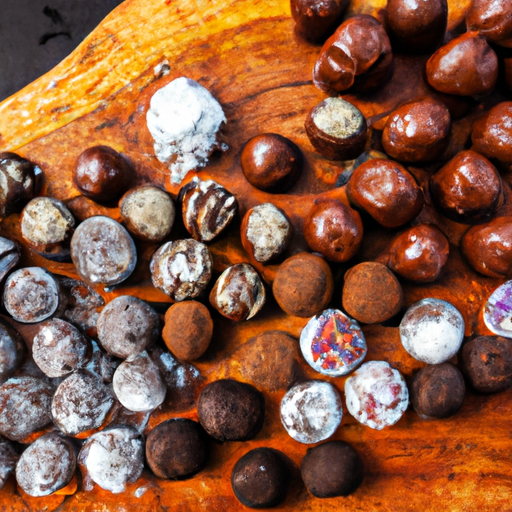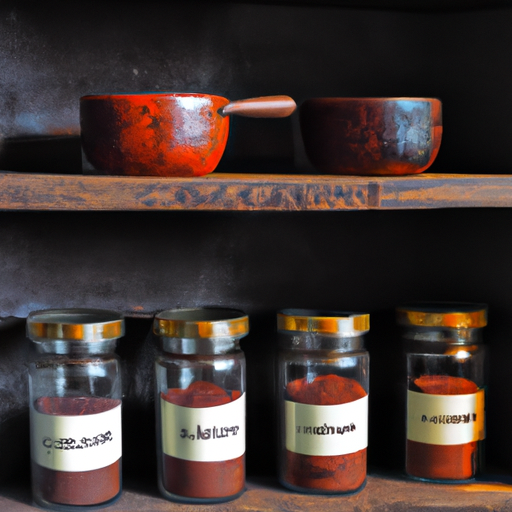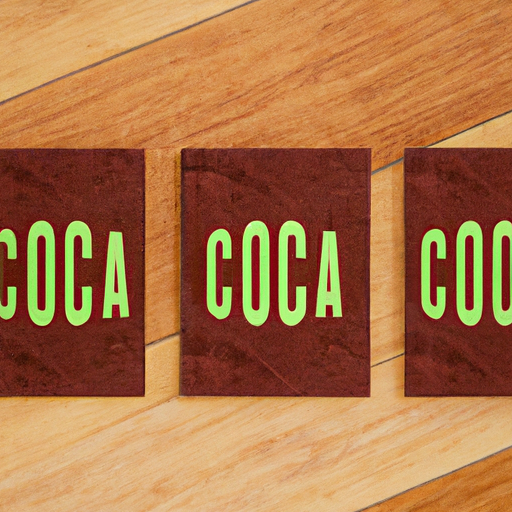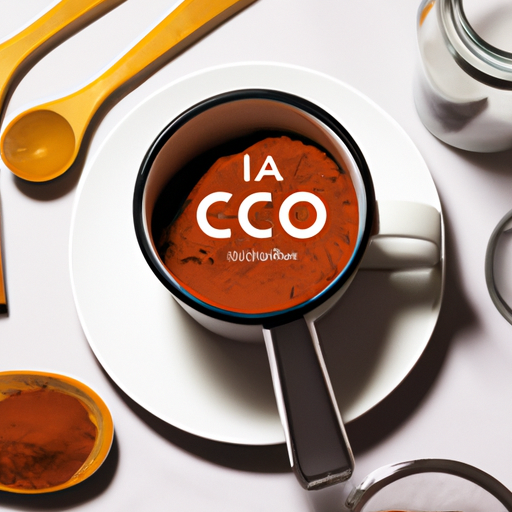Cacao's journey starts over 3,500 years ago with the Olmec civilization, where it was revered as a medicinal ingredient and ceremonial drink. The Maya and Aztecs considered it the "Food of the Gods," using cacao beans as currency and in rituals. Fast forward to today, raw cacao is celebrated as a modern superfood, packed with antioxidants and essential minerals. Its health benefits include improved heart health and mood enhancement. By incorporating cacao into your diet, you're tapping into its rich history and well-being advantages. Stick around, and you'll uncover even more fascinating details about cacao's evolving role in our lives.
Key Takeaways
- Cacao originated with the Olmecs around 1500 BC, revered for its medicinal properties and cultural significance in Mesoamerican societies.
- Ancient cultures used cacao as a ceremonial beverage and currency, showcasing its economic and spiritual importance.
- Historical texts document over 100 medicinal uses of cacao, treating various ailments and enhancing overall health.
- Modern research highlights cacao's antioxidant properties and nutrient density, contributing to its status as a superfood.
- Cacao's culinary versatility allows incorporation into healthy diets, from smoothies to baked goods, while acknowledging environmental and ethical challenges in its cultivation.
Historical Origins of Cacao
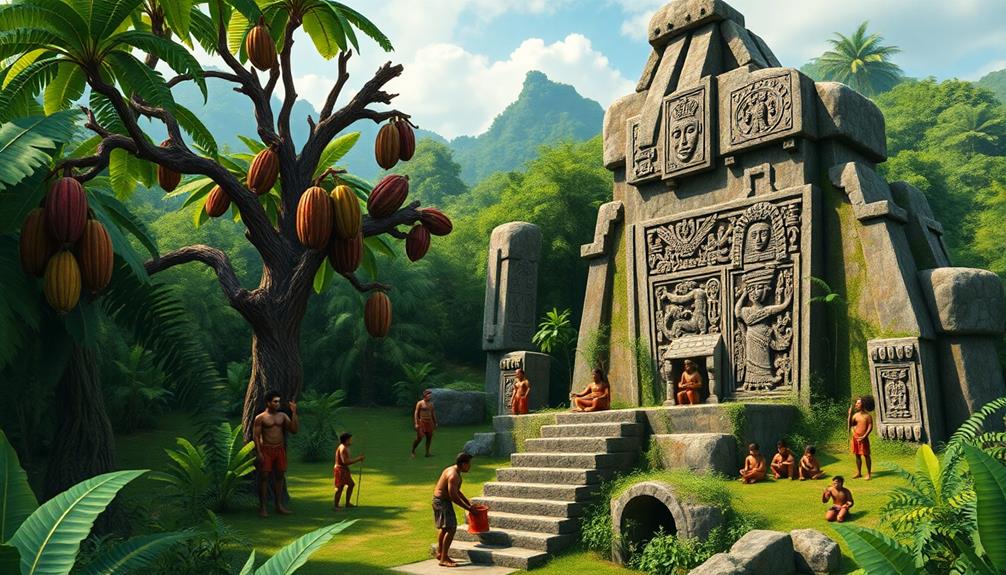
Cacao, with its rich history, traces back to the Olmec civilization in present-day Mexico around 1500 BC. This ancient civilization revered cacao not just as a food source but also as a form of ancient medicine. The term "cacao" itself finds its roots in the Olmec and Mayan languages, with "cacahuatl" emerging from the Nahuatl language of the Mexica.
In these early Mesoamerican societies, cacao held immense cultural significance. It was often used in rituals and served as currency, indicating its esteemed status.
As you explore deeper into historical texts, you'll find that the medicinal applications of cacao were documented in works like the Badianus Codex (1552) and the Florentine Codex (1590). These texts outline how cacao was utilized to treat various ailments, showcasing its importance in ancient medicine.
Medicinal Applications of Cacao
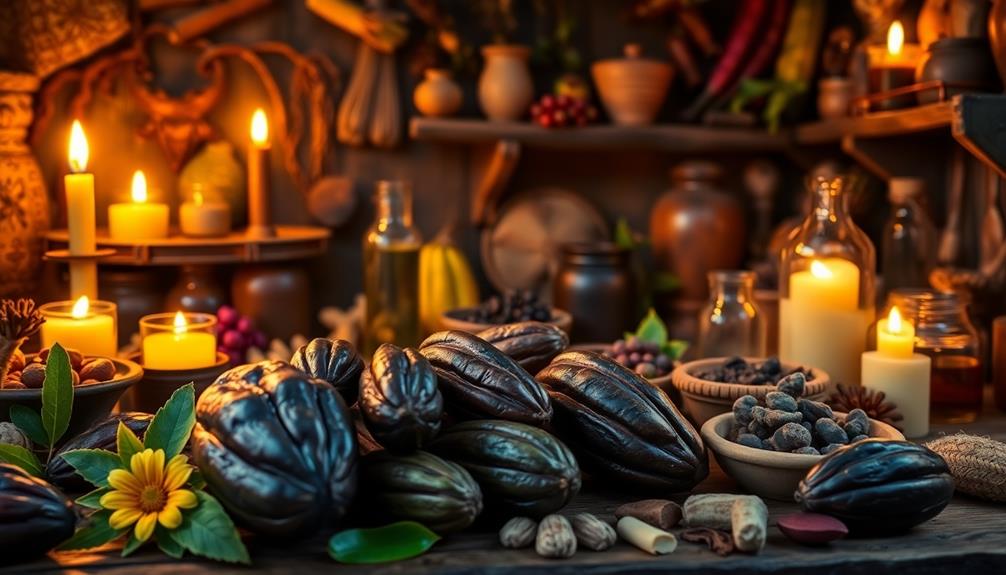
Cacao isn't just a tasty treat; it has a rich history of medicinal use that dates back centuries.
You'll find that ancient cultures relied on cacao for its healing properties, using it to treat various ailments and improve overall health.
Today, modern science continues to explore cacao's nutritional benefits and its potential in contemporary medicine.
Historical Healing Practices
Throughout history, numerous cultures have turned to cacao for its remarkable healing properties. You might be surprised to learn that cacao beans were more than just a treat; they played a significant role in ancient medicinal practices.
For instance, texts like the Badianus Codex and Florentine Codex documented cacao's use in treating various ailments, from anemia to mental fatigue. If someone was emaciated or exhausted, cacao was often recommended to promote weight gain and restore liveliness.
Cacao also improved digestion and elimination, making it beneficial for those struggling with weak stomachs. Its unique ability to mask the bitter taste of other medicinal substances allowed it to serve as a vehicle for administering drugs effectively.
Over the centuries, manuscripts identified over 100 medicinal uses for cacao and chocolate, highlighting its integration into European medicinal practices from the 16th to early 20th centuries.
As you explore the history of raw cacao, remember that its legacy in healing is as rich as its flavor, providing a fascinating glimpse into how cultures have valued this extraordinary ingredient for centuries.
Nutritional Benefits Overview
What makes raw cacao a powerhouse of nutritional benefits? The historical use of cacao beans in ancient medicine demonstrates its significant medicinal applications. Cacao was revered for addressing various ailments, making it a remarkable natural remedy.
Here's a quick overview of its key benefits:
- Boosts Energy: Cacao stimulates the nervous system, helping combat mental fatigue and apathy.
- Enhances Digestion: It improves digestion and elimination, addressing issues like weak stomach conditions.
- Supports Appetite: Historically, cacao was used to treat poor appetite, making it beneficial for those needing to gain weight.
- Rich in Nutrients: Cacao is packed with antioxidants, vitamins, and minerals that support overall health.
- Versatile in Medicine: Ancient cultures even used chocolate paste to mask the bitter taste of other medications, enhancing their acceptance.
With over 100 documented medicinal uses in colonial texts, cacao's versatility and effectiveness in ancient healing practices spotlight its lasting legacy.
Embracing raw cacao not only connects you to this rich history but also allows you to harness its powerful nutritional benefits today.
Modern Medicinal Uses
Raw cacao's medicinal applications extend well beyond its ancient uses, showcasing its relevance in modern health practices. You might be surprised to learn that cacao has been linked to treating various ailments, from anemia to mental fatigue.
Historically, cacao was used as a remedy to stimulate the nervous system and improve digestion, documented in texts like the Badianus Codex and Florentine Codex. Additionally, the rich nutrient profile of cacao, including its low carb high protein breakfast ideas, makes it a fantastic addition to healthy meals.
Today, the health benefits of cacao are backed by research. The flavonoids found in cacao beans are known to enhance blood vessel function, lower blood pressure, and improve circulation, making cacao a valuable ally for cardiovascular health.
These compounds also exhibit antioxidant properties, which can help reduce inflammation and support overall wellness.
Moreover, cacao's versatility shines when it comes to administering medications. Its rich flavor can effectively mask the bitterness of other drugs, making it an appealing option in herbal preparations.
As modern studies continue to explore cacao's potential, it's clear that this ancient superfood remains a potent tool in the quest for better health. Incorporating raw cacao into your diet could provide you with a delicious way to boost your well-being.
Cultural Significance of Chocolate

Cacao's cultural significance stretches back thousands of years, deeply rooted in the traditions of ancient civilizations like the Maya and Mexica. Revered as the "Food of the Gods," cacao was more than just a beverage; it played an essential role in rituals and social gatherings, symbolizing wealth and status.
You'd find cacao beans used as currency in Aztec society, valued even more than gold.
Here are some key aspects of cacao's cultural importance:
- Sacred beverage in rituals, reinforcing spiritual beliefs.
- Strengthened community bonds through shared consumption during ceremonies.
- Elaborate vessels depicted cacao preparation, highlighting its ritualistic significance.
- Shift from indigenous practices to European luxury symbol in the 1500s.
- Cacao beans served as a form of currency, showcasing its economic value.
As you explore chocolate's rich history, remember that it embodies more than a sweet treat; it reflects the social, economic, and spiritual fabric of ancient cultures.
The legacy of cacao continues to shape modern chocolate's luxurious reputation, reminding us of its profound roots in human civilization.
Cacao Preparations and Forms
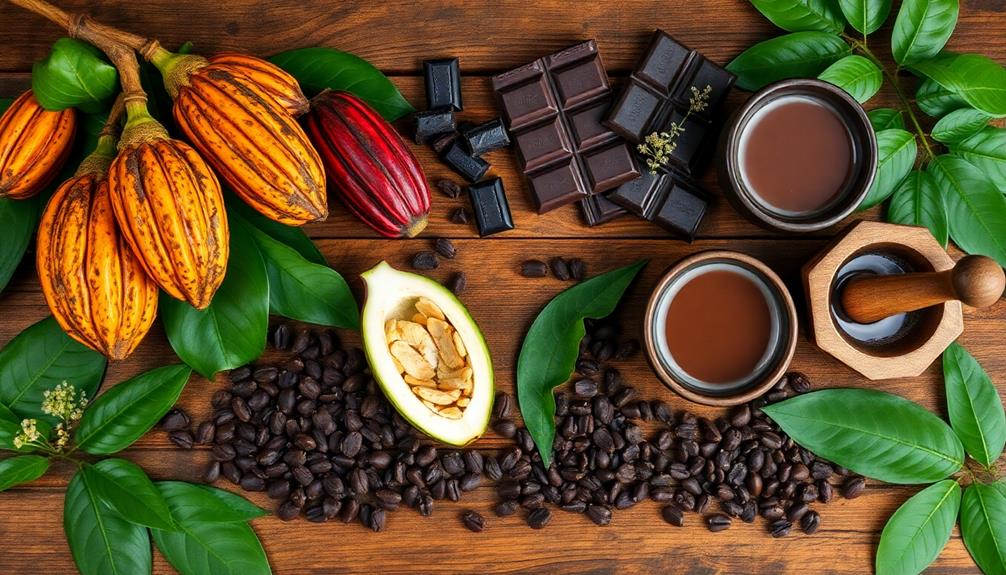
When you explore cacao preparations, you'll discover a rich history of traditional methods that turn raw cacao into various forms for both culinary and medicinal uses.
From grinding beans to create beverages to utilizing cacao butter for skin treatments, each form serves a unique purpose.
You'll see how these practices have evolved, blending ancient wisdom with modern culinary creativity.
Traditional Preparation Methods
Throughout history, indigenous cultures have turned to traditional cacao preparations for both nourishment and healing. The process often began with grinding cacao beans into a rich paste, which was then mixed with water and various ingredients to create a beverage that was typically served hot and unsweetened. This method not only provided energy but also served medicinal purposes.
Here are some traditional cacao preparations you might find interesting:
- Cacao paste: Ground cacao beans mixed with water for a thick drink.
- Cacao drinks: Often combined with spices or herbs for enhanced flavor and health benefits.
- Cacao butter: Extracted from cacao beans, used for soothing burns and skin irritations.
- Medicinal cacao: Ancient texts documented recipes to treat ailments using cacao leaves and flowers.
- Ceremonial vessels: Nobility often used elaborately decorated cups, showcasing cacao's cultural significance.
These traditional methods highlight how cacao wasn't just a source of enjoyment but also an essential part of ancient healing practices.
Medicinal Cacao Forms
The versatility of cacao extends far beyond its delightful flavor, as it has served various medicinal purposes throughout history. Ancient cultures utilized cacao beans, bark, and even flowers for their medicinal applications. Cacao paste was especially popular, as it masked the bitter taste of medications, making treatments more palatable. This clever use of cacao helped administer remedies for a range of ailments, showcasing its importance in early medicine.
Historical texts highlight the use of cacao flowers in combating fatigue, illustrating the plant's broad array of medicinal benefits. Traditional preparation methods involved grinding cacao beans and mixing them with other ingredients, reflecting the complexity of its use in ancient healing practices.
Beyond just energy enhancement, cacao was recognized for its effectiveness in treating burns, bowel dysfunction, and skin irritations.
Modern Culinary Applications
How can cacao elevate your culinary creations? With its versatile forms—cacao powder, cacao butter, and nibs—you can enhance the flavor, texture, and nutritional value of your dishes.
Here's how to incorporate cacao in your kitchen:
- Smoothies: Blend cacao powder into your morning smoothie for a rich chocolate taste and added antioxidants.
- Baked Goods: Use cacao powder in brownies, cookies, or cakes to provide depth and a health boost without sacrificing flavor.
- Snacks: Sprinkle cacao nibs on yogurt or granola for a crunchy texture and a superfood punch.
- Cooking: Melt cacao butter to create creamy sauces or dressings, adding richness to savory dishes.
- Beverages: Craft your own drinks by mixing cacao powder with spices and sweeteners, reminiscent of ancient cocoa beverages.
Evolution of Chocolate in Medicine
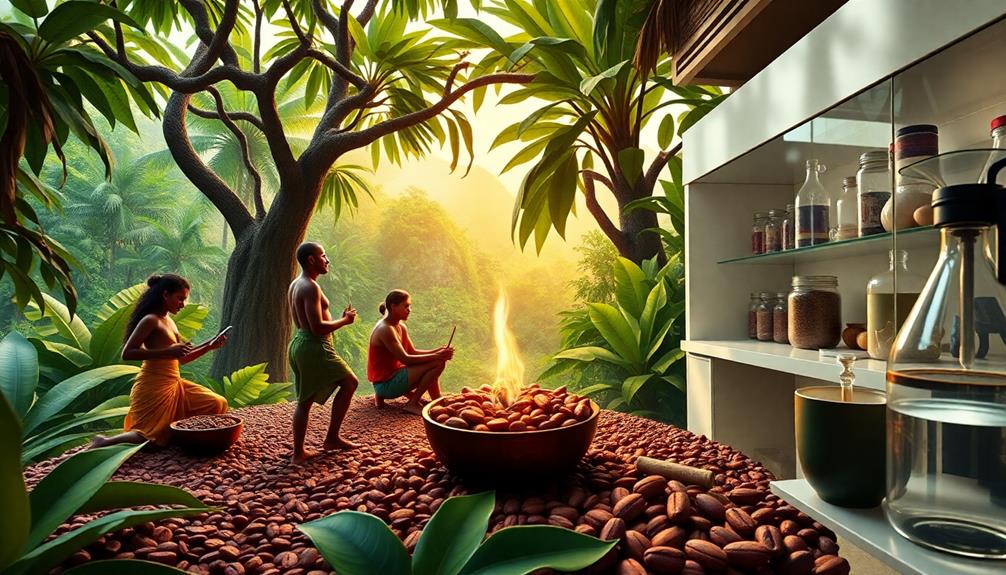
Historically, cacao's role in medicine has been significant, with numerous manuscripts documenting over 100 medicinal uses from the 16th to the early 20th century. When cacao made its way into European medicinal practices in the mid-1500s, its health benefits became increasingly recognized.
You'd find historical texts detailing its use for various ailments like emaciation, anemia, poor appetite, and digestive issues. This highlights cacao's versatility as a natural remedy.
Cacao also played an essential role in enhancing patient compliance. By serving as a vehicle for administering other medications, it effectively masked the bitter taste of certain drugs. This clever use of cacao in medical treatments made it easier for patients to take their necessary medications.
As you explore modern research, you'll discover that scientists continue to investigate cacao's health benefits today. They focus on its flavonoids, which are linked to improved cardiovascular health and cognitive function.
Cacao's journey from a medicinal staple to a sought-after superfood showcases its enduring legacy, emphasizing its importance not just in culinary delights, but also in the domain of health and wellness.
Nutrient Profile of Cacao
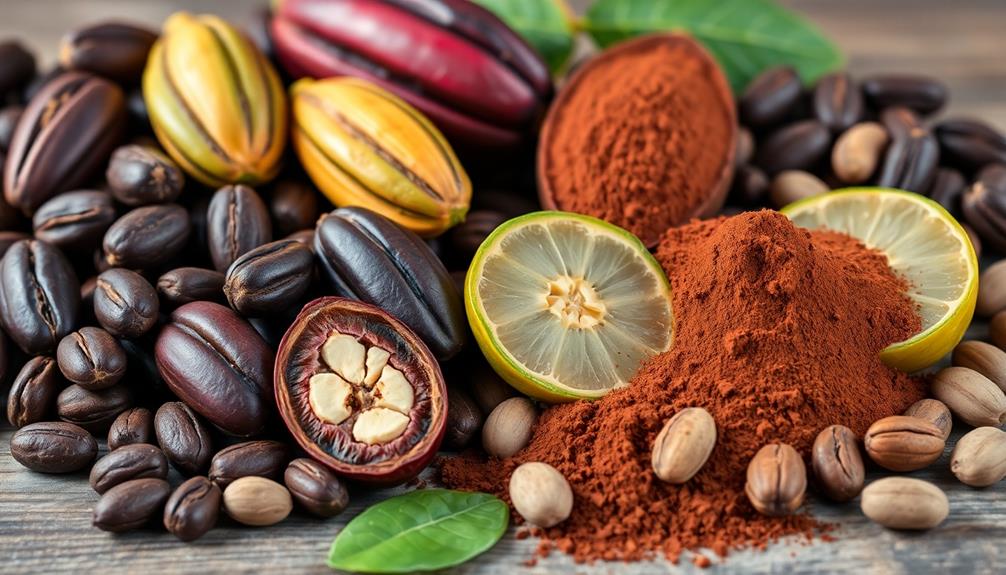
Rich in essential nutrients, raw cacao packs a powerful punch for your health. This incredible product from the cacao plant is celebrated not just for its rich flavor but also for its impressive nutrient profile, making it a true superfood.
You'll find that raw cacao is loaded with:
- Flavonoids: These antioxidants help neutralize free radicals and reduce oxidative stress.
- Essential minerals: Magnesium, iron, potassium, calcium, zinc, and copper support various bodily functions.
- Dietary fiber: Promotes healthy digestion and supports gut health.
- Beneficial vitamins: Includes vitamin E and several B vitamins, vital for skin health and energy production.
- Low sugar content: A healthier alternative to many processed chocolate products.
Incorporating raw cacao into your diet can elevate your nutritional intake greatly.
Whether you sprinkle it on smoothies, mix it into baked goods, or enjoy it in a warm drink, you're fueling your body with a powerhouse of nutrients.
Embrace the benefits of this superfood and make raw cacao a staple in your wellness journey!
Health Benefits of Cacao
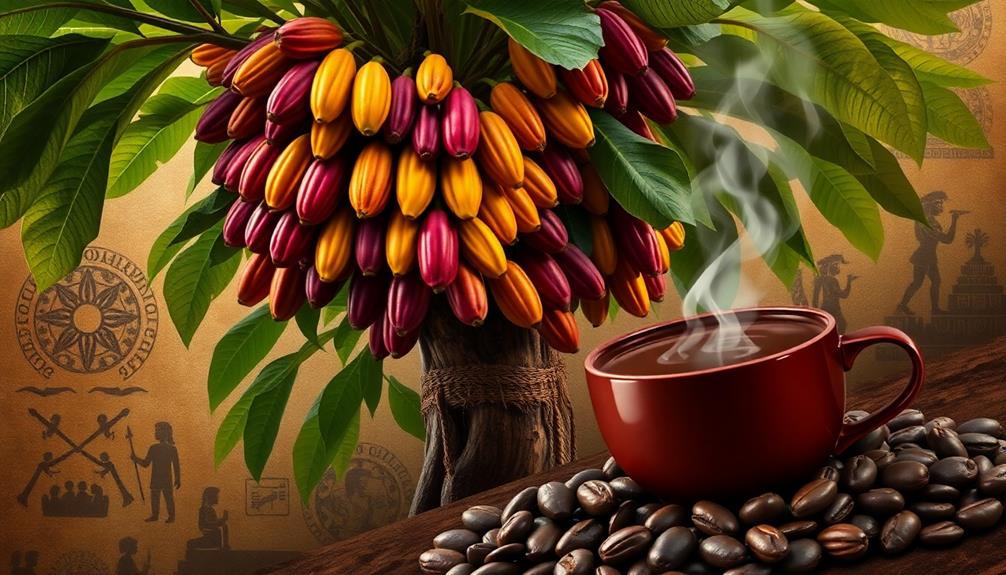
Cacao brings a wealth of health benefits that can truly enhance your well-being. Packed with cacao beans, this superfood offers rich flavonoids, which improve blood vessel function, lower blood pressure, and enhance circulation, all contributing to cardiovascular health.
If you're looking for a natural mood booster, theobromine and phenylethylamine (PEA) found in cacao can elevate your mood and enhance cognitive function.
Moreover, cacao is loaded with antioxidants that exhibit anti-inflammatory effects, potentially benefiting conditions like arthritis while promoting overall wellness. Regularly consuming cacao can also reduce the risk of neurodegenerative disorders and improve brain health, thanks to its impressive nutrient profile.
Additionally, cacao contains essential minerals such as magnesium, iron, and zinc, which support various bodily functions, including immune function and energy production.
With these remarkable health benefits, incorporating cacao into your diet can be a delicious way to support your well-being. Whether you enjoy it in smoothies, desserts, or hot drinks, you'll appreciate how cacao enhances both your health and your taste buds.
Environmental and Ethical Challenges
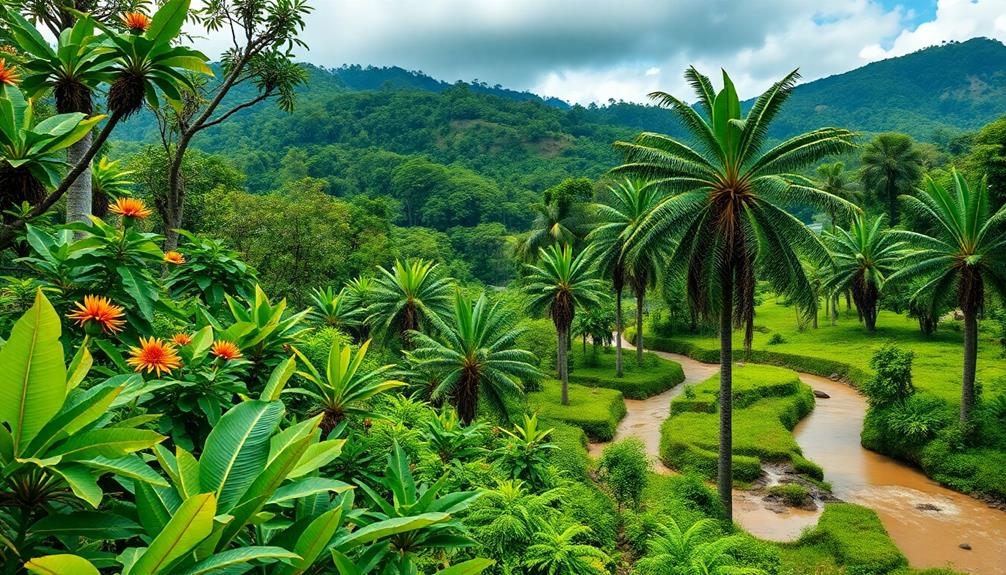
The chocolate industry's allure often masks significant environmental and ethical challenges tied to cacao cultivation. As you indulge in your favorite chocolate treat, consider the impact cacao plantations have on the environment and the communities involved in their production.
Understanding the financial implications of diversification strategy in investment can also relate to ethical sourcing, as supporting sustainable practices can enhance overall portfolio stability.
- Deforestation is rampant, leading to biodiversity loss.
- Monoculture farming practices degrade soil health.
- Millions of children are reportedly involved in cocoa farming, particularly in West Africa.
- Poor working conditions are prevalent, raising serious ethical concerns.
- Supporting Fairtrade-certified companies can promote fair compensation for farmers.
To combat these issues, sustainable practices like agroforestry and organic farming are essential. They not only help mitigate environmental damage but also promote biodiversity.
By choosing products from Fairtrade-certified sources, you can play a role in addressing economic disparities and ensuring ethical sourcing in the cacao industry.
As consumers increasingly demand transparency and sustainability, it's vital for the chocolate supply chain to balance ethical sourcing with profitability.
Incorporating Cacao Into Your Diet
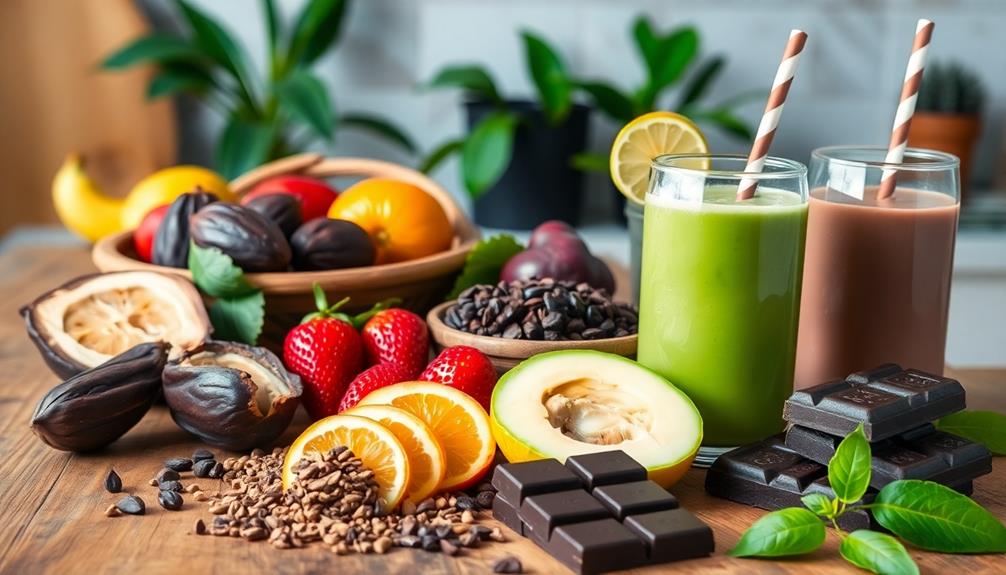
Incorporating raw cacao into your diet can be a delicious way to boost your health. You can easily add cacao nibs or powder to your smoothies, oatmeal, or baked goods, enjoying a rich chocolate flavor while reaping its numerous health benefits.
For the best results, stick with dark chocolate that has a cocoa content of 70% or higher. This guarantees you maximize antioxidants and minimize added sugars and fats.
Cacao powder makes a fantastic substitute for cocoa powder in your recipes, packing essential minerals like magnesium, iron, and zinc.
If you're on the go, consider trying Crafty Weka Bars, which contain high cacao content and offer a convenient way to enjoy cacao's health benefits.
Regularly including cacao in your diet may support heart health, improve mood, and enhance cognitive function thanks to its rich flavonoid content.
Frequently Asked Questions
What Is the Origin and History of Cacao?
Cacao originated in Central and South America around 1500 BC, cherished by ancient cultures like the Olmec, Maya, and Aztec. They brewed it for rituals and valued its beans as currency, shaping its historical significance.
What Was the Ancient Use of Cacao?
Ancient civilizations used cacao for its medicinal properties, treating ailments like anemia and digestive issues. You'd find it in xocolatl, a bitter drink often flavored with honey and spices, playing a key role in rituals and social gatherings.
How Was Cacao Used as Medicine?
Cacao's delightful essence once served as a subtle remedy, aiding your body's recovery. It's supported energy, improved digestion, and even encouraged weight gain, showcasing its remarkable versatility in ancient healing practices and traditional medicine.
What Is the History of Ceremonial Cacao?
Ceremonial cacao dates back to ancient Mesoamerican cultures, where you'd find it used in rituals for spiritual enhancement. Today, you can still experience its heart-opening effects in modern ceremonies focused on connection and personal transformation.
Conclusion
Incorporating cacao into your diet isn't just a tasty treat; it's like revealing a treasure chest of history, health, and culture. From its ancient roots to its modern-day superfood status, cacao offers a delicious way to nourish your body and soul. Embrace the rich tapestry of flavors and benefits that cacao brings, and let it weave its magic into your meals. So go ahead, savor that dark chocolate square and relish the journey of cacao through time!



